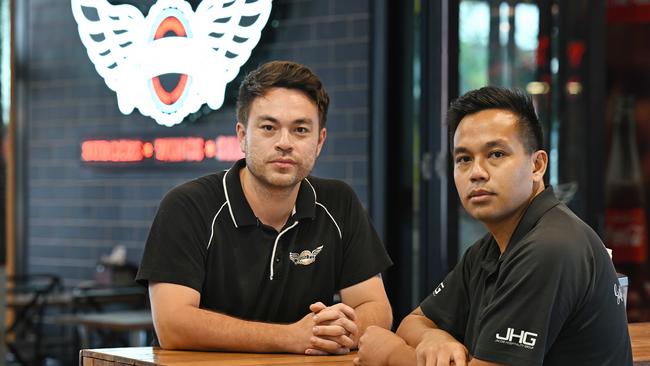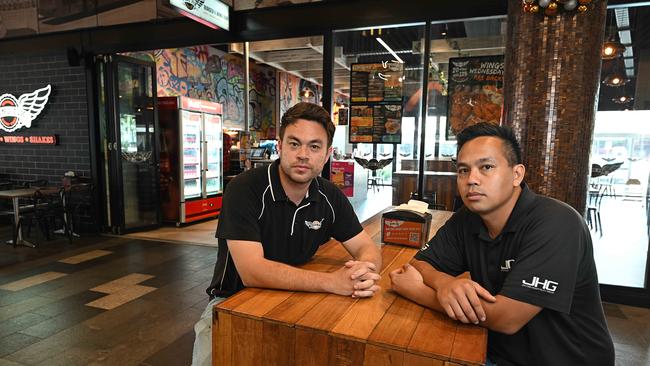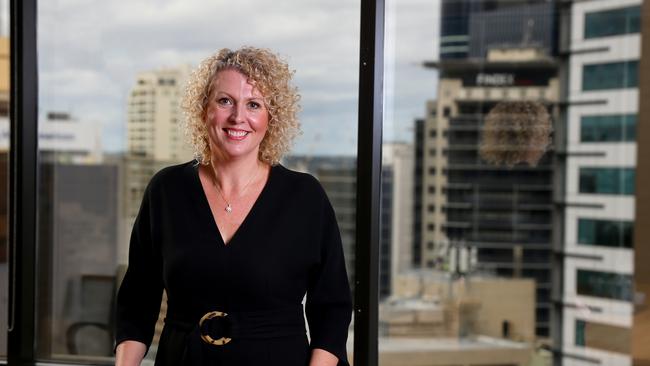Brisbane restaurants, cafes hit by ‘record-level’ insolvencies as cult burger bar Wing Fix collapses
A popular burger bar is one of the latest high-profile Brisbane hospitality companies to fold after years of skyrocketing operating costs and tightening customer spending.
QLD Business
Don't miss out on the headlines from QLD Business. Followed categories will be added to My News.
Restaurant and cafe insolvencies are surging in Queensland with a cult-favourite burger joint the latest to collapse.
Robinson Cotter Insolvency Group director Bill Cotter said Queensland’s hospitality and retail sectors were experiencing record-level insolvencies this year, on par with those in Victoria and New South Wales.
He said insolvencies in these sectors had increased by 49 per cent in the past financial year.
One business to fold was burger chain Wing Fix which had venues in Coorparoo and Newmarket.
Owners Peter and Ross Jacobi said they made the tough decision last month to liquidate the popular business.
Peter Jacobi said the past five years had been incredibly tough.
“You probably couldn’t write a worse run for hospitality in particular, but small business or even business in general,” Mr Jacobi said.
“It’s been really tough the last five years, but in particular the last two years, since back to back to back to back interest rate rises, which is something that the hospitality industry or small business haven’t really had to go through.”

Some of the high-profile hospitality company collapses over the past few months include the voluntary liquidation of City Winery which had six venues across Brisbane.
It also includes BCN Events Group which operated cafes Mica in Newstead, Mica Express in Brisbane’s CBD, and King St Bakery in Bowen Hills, and the shock closure of popular restaurant and cocktail bar The Matriarch.
Mr Jacobi said it was a heartbreaking decision to watch the business that the brothers started out of a market stall close after seven years due to skyrocketing costs.
“Over the past 12 months, we’ve had protein go up 30 per cent, beets go up 25 per cent, dairy has gone up 20 per cent fresh produce, 10 to 15 per cent flour goes into our burger buns,’ Mr Jacobi said.
“When you combine that with a decrease in sales and already fine margins and people who already can’t afford to eat out and it needs to become more expensive to become more viable for the business.”
In September figures from the Australian Securities & Investments Commission (ASIC) revealed there were just over 11,053 insolvency appointments in the 2024 financial year, skyrocketing by 39.1 per cent increase in the year prior.
The appointments had also soared by a massive 124 per cent more than 2022.
The hospitality and retail sectors have been impacted as a result of lower consumer spending. Combined, the construction, hospitality and retail sectors account for about 50 per cent of all insolvencies in Australia.

Retail and hospitality were suffering the most; both had a 49 per cent increase in businesses collapsing because of thinning margins caused by lower consumer spending and confidence, against a backdrop of higher costs.
Mr Cotter said liquidations were now above pre-Covid levels.
“Obviously we had pre-Covid normal, and Covid insolvencies dropped away to virtually zero initially, and now we’re back to that sort of above that pre-Covid level,” Mr Cotter said.
Mr Cotter said businesses were now feeling the pinch after the small businesses Covid-19 grant program has since dried up.
“That’s sort of why, the combination of the catch up and of the sort of the increasing sort of volume of businesses sort of struggling,” Mr Cotter said.
“Well, we’re only a relatively small firm, so whether that number means anything, certainly inquiries at a very high level, I’d say across the firm, we might be seeing half a dozen to 10 sort of new inquiries a week.”
Business Chamber Queensland chief executive Heidi Cooper said data shows businesses in every industry, of every size and in every part of the state were facing a series of economic pressures that impact day-to-day profitability and viability.

“If Queensland businesses don’t see some of the critical relief they need, the risk is more businesses will have to face this decision more often,” Ms Cooper said.
“Among these pressures are historically high wage costs, escalating energy costs, low productivity and increasing regulatory burden along with significant macro issues around inflation and interest rates.”
Ms Cooper said this pain is being felt across the state with the private sector best placed to be involved in and benefit from the growth from the Olympic and Paralympic Games.
“Increased global demand for Queensland-made goods and services, the energy transition and the big build,” she said.
“This will take genuine business policy reform, designed to deliver long-term economic outcomes that stimulate economic growth and enable the private sector.”
A recent analysis of NAB consumer spending data for Brisbane comparing the 2023 to the 2024 financial year showed growth for both hospitality and retail spending but slowing some areas.
Discount stores in Brisbane were up by 142 per cent while restaurants saw only small growth of spending up by 0.3 per cent and bars and pubs by 1 per cent.
The Australian hospitality sector is battling tough economic conditions with a list of collapsed companies mounting, as well as for businesses generally.


